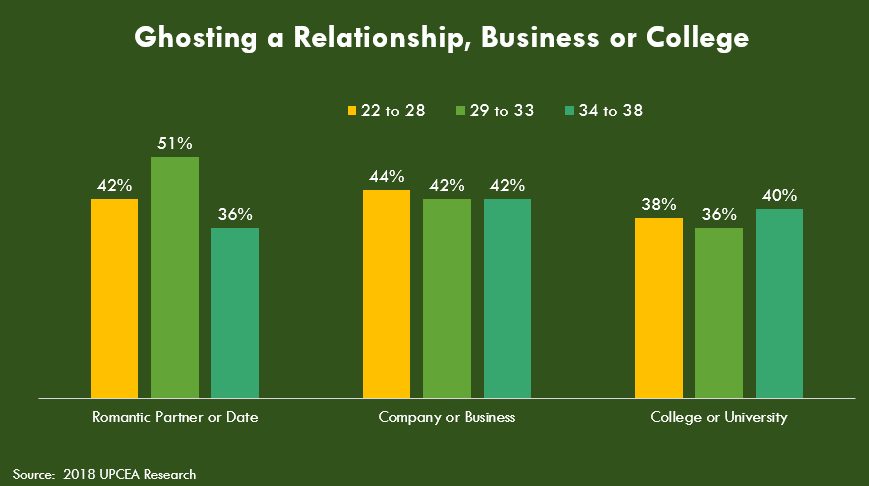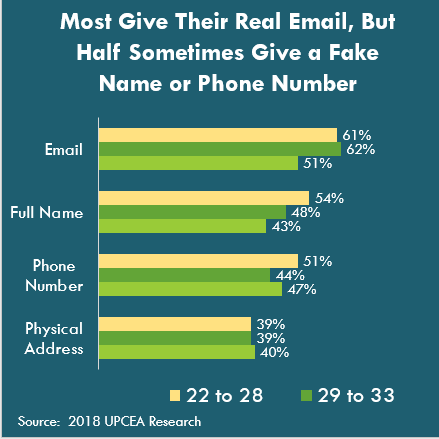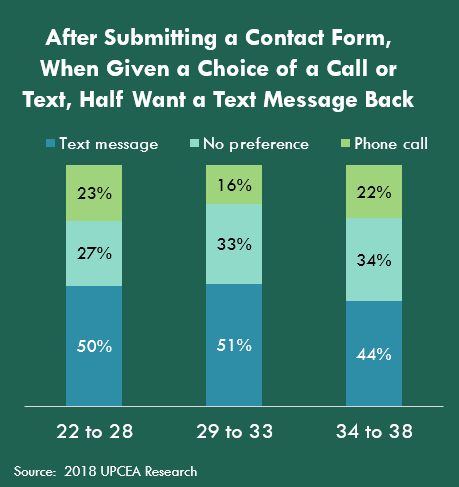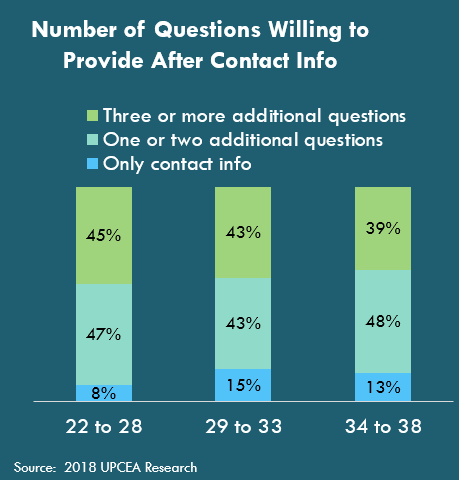Exposing Generation Z and Millennials in the Enrollment Management Process
With Halloween only recently past, ghosts still are among us in society. They live among and can frequent colleges and universities, even our professional, continuing and online education units through “ghosting.” Ghosting is a term often associated with younger generations regarding relationships. However, the phrase has recently started entering the workplace with new hires not showing up for their first day or potential employees not showing up for interviews. However, what about the ghost inquirer to the university, one that is seeking professional, continuing, or online education?
Ghosting is basically ending a relationship without notification, despite the other member’s attempts to communicate. UPCEA’s Marketing and Enrollment Management Seminar addressed many issues related to marketing and prospect and inquiry management, including enrollment funnels and digital marketing. With Generation Z quickly moving in as a major adult learner segment and with Millennials becoming managers and decision-makers, understanding the drivers and reasons for ghosting is critical in a changing economy.
Ghosting is often done to avoid conflict or to keep options open. It can also be a form of passive aggressiveness in a situation. It also may be preventable for PCO units and their enrollment managers and help to convert prospects, as well as reduce costs by not having to service true non-targets. Some of the reasons for ghosting in the inquiry process could include:
- Being asked too much information too quickly
- A prospect inquiring with many similar providers (as they have leverage and options)
- Not having enough information and therefore embarking into an uncertain relationship
- Being interested but waiting to hear back from other providers before making a decision
- An inability to say “no, not interested”
UPCEA recently conducted a survey of young people, those between the age of 22 and 37 and found that almost half had ghosted another person in a relationship and approximately 40% have ghosted a business or establishment they’ve contacted but are no longer interested in. Many have also reported contacting a college or university and ghosting them, as opposed to formally ending the relationship or keeping options open for the future.

There could be many reasons, some of which could include an awkward or under-developed relationship that has been created. PCO units can work to minimize this by better targeting their messages, strategizing their touch points and designing their communications more toward the target market.
Universities can also avoid moving too fast in the relationship. In working with a number of UPCEA members, the UPCEA Center for Research and Strategy has found websites targeted to unintended audiences, excessive contact forms, or mismanaged social media efforts. In the case of the contact form, younger audiences will leave information behind, but not too much. The figure to the right shows that young people are willing to provide their emails, but not necessarily other information. When a prospect is early in the inquiry process, a physical address is not necessarily needed, unless they show true interest.


Asking for a physical address too early may inadvertently leave an abandoned form or one with misinformation. In fact, many young people surveyed may leave an incorrect cell number in the case of a form requiring it unnecessarily. In fact, when the cell phone is a voluntary field and the inquirer fills it out, then that alone is valuable information that they may desire a text message follow-up or an immediate call. The research shows that after giving their cell phone number about half prefer a text message over a phone call.
The research also shows that after basic contact information, that survey respondents are willing to tolerate a few more questions, most likely around areas of interest or information on how they would like to be contacted, but not necessarily personal or identifying information or excessive questions. Colleges and universities are used to asking prospects to fill out applications or forms. Much of this is a result of a greater level of patience for the format from other generations, but also from a “power” or “leverage” perspective. Colleges and universities had more leverage to ask for this information. With greater educational choices, asking for too much information could in fact create a competitive disadvantage for the institution. A Generation Z’er might say “Heck, I’m not filling out this form…College A and B don’t ask for it.” Information in today’s age has to be earned and not demanded.

PCO units and their marketing and enrollment management groups need to examine their processes. They must not get lazy in asking for too much information too soon and as a result, scare their prospects away and create “ghosting” relationships. By examining processes and centering the enrollment management process around this new generation, ghosts are likely to show themselves (as they did with Jennifer Love Hewitt in the popular television series “The Ghost Whisperer”) or go to a different realm, one where they will do less damage or use no additional resources.
Learn more about UPCEA's expert consultants.
Do you need help with your PCO unit or campus? We can help. Contact UPCEA Research and Consulting for a brief consult. Email [email protected] or call us at 202-659-3130.
Trusted by the nation's top colleges and universities, UPCEA Research and Consulting provides the best value in the industry today. UPCEA's industry experts have years of experience in Online and Professional Continuing education - put them to work for you!
UPCEA Research and Consulting offers a variety of custom research and consulting options through an outcomes-focused pricing model. Find the option(s) that best suit your institution.
Learn more about UPCEA Research & Consulting
The UPCEA Difference
Unmatched Experience: For more than 100 years, UPCEA consultants have exclusively served the needs of online and professional continuing education programs. UPCEA consultants leverage their extensive industry expertise to expedite solutions, anticipate upcoming shifts, and offer distinct best practices, effectively aiding clients in achieving their goals.
Cost Effectiveness: As a nonprofit, member-serving organization, we provide unmatched value, allowing you to maximize limited research and consulting budgets.
Action in Motion: Our cadre of experienced, skilled authorities and expert practitioners propels you forward, translating research and consulting into impactful implementation, a distinctive hallmark of UPCEA. Our team of current and former institutional leaders will support you, turning research and consulting into action.
Mission Alignment: Like you, our mission is to enhance and expand educational opportunities and outcomes for adult and other non-traditional learners. We share your values and work in partnership with you to advance access and excellence in education.
